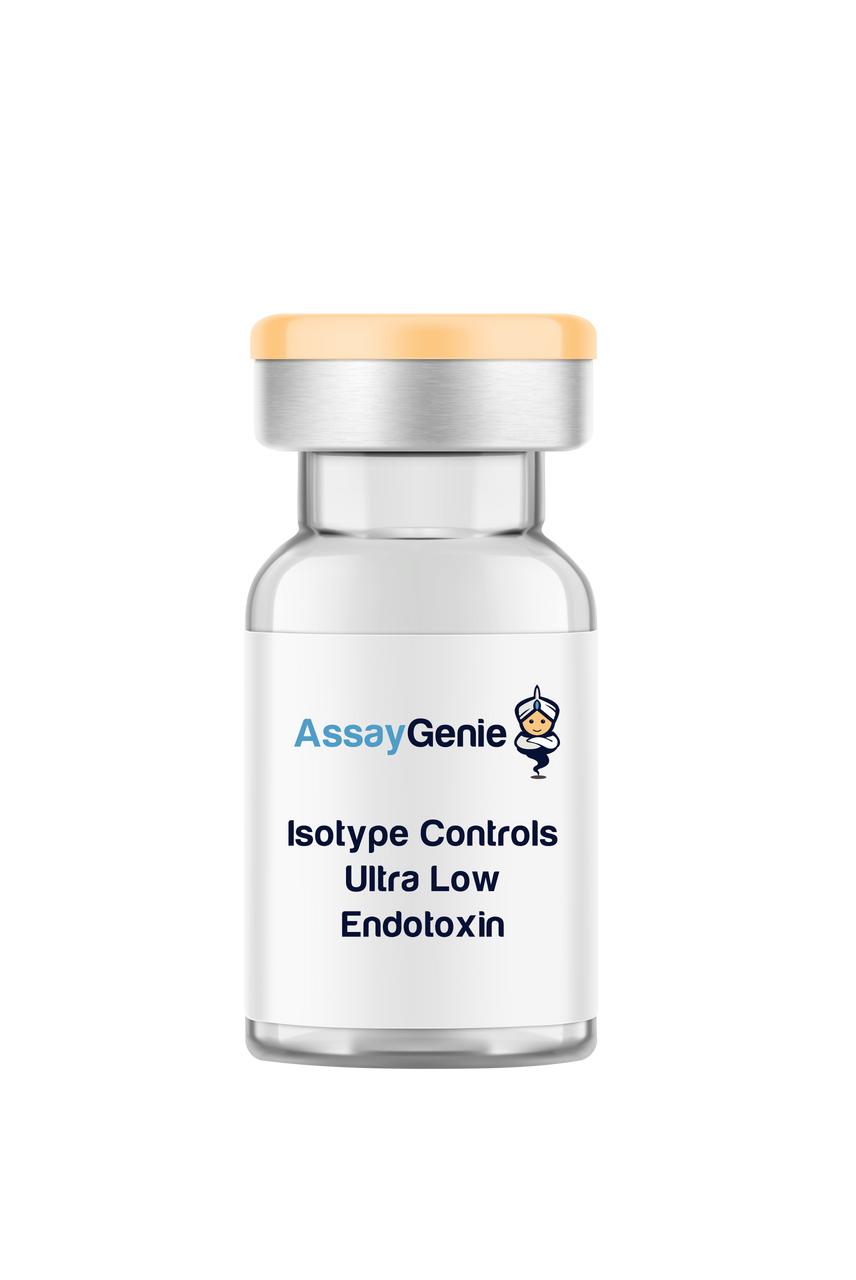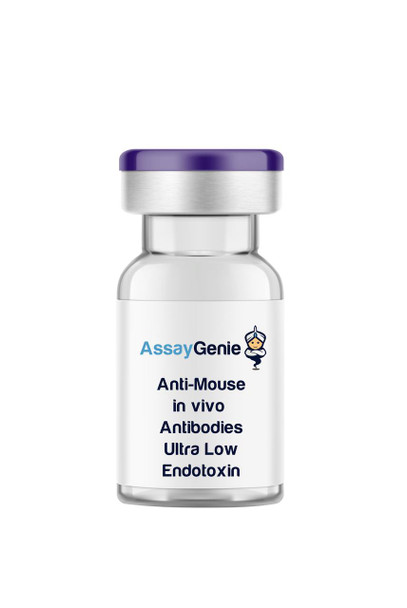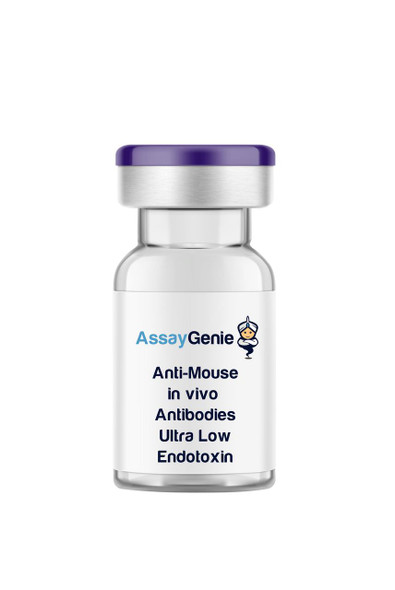Anti-Mouse LPAM-1 In Vivo Antibody - Ultra Low Endotoxin (IVMB0090)
- SKU:
- IVMB0090
- Antibody Type:
- Functional-Grade In Vivo Antibody
- Applications:
- In Vivo
- Disease Area:
- Cancer
- Clone:
- DATK32
- Protein:
- LPAM-1
- Isotype:
- Rat IgG2a kappa
- Reactivity:
- Mouse
- Synonyms:
- alpha-4 beta-7 Integrin
- CD49d/beta-7
- LPAM-1
- ITGA4
- ITGB7
- Research Area:
- Adhesion & Migration
- Endotoxin Level:
- Ultra Low Endotoxin
- Host Species:
- Rat
- Blocking
- FC
- IHC FF
- IP
Description
Anti-Mouse LPAM-1 In Vivo Antibody - Ultra Low Endotoxin
Introducing the Anti-Mouse LPAM-1 In Vivo Antibody - Ultra Low Endotoxin from Assay Genie, a highly specific monoclonal antibody meticulously designed for in vivo applications. This antibody targets the LPAM-1 (Lymphocyte Peyer’s Patch Adhesion Molecule 1) protein, indispensable for immune cell trafficking, making it an ideal tool for research in immunology and related fields. With a [specific isotype], it ensures high purity and ultra low endotoxin levels (<0.002 EU/µg), perfect for sensitive applications such as ELISA, flow cytometry, immunohistochemistry, and more. Available in various sizes, it is formulated in phosphate-buffered saline for optimal stability and efficacy.
Elevate your research with this reliable and versatile antibody. LPAM-1, also known as integrin alpha 4 beta 7, is expressed on the surface of various immune cells, including T-lymphocytes and B-lymphocytes. It plays a critical role in the homing and retention of lymphocytes to the gut-associated lymphoid tissue (GALT), facilitating the immune response in the gastrointestinal tract. Utilizing the Anti-Mouse LPAM-1 Antibody from Assay Genie can significantly advance your understanding of immune cell adhesion and migration, enhancing the depth and breadth of your immunological research.
| Product Name: | Anti-Mouse LPAM-1 In Vivo Antibody - Ultra Low Endotoxin |
| Product Code: | IVMB0090 |
| Size: | 1mg, 5mg, 25mg, 50mg, 100mg |
| Clone: | DATK32 |
| Protein: | LPAM-1 |
| Product Type: | Monoclonal Antibody |
| Synonyms: | alpha-4 beta-4 Integrin, CD49d/beta-4 , LPAM-1, ITGA4, ITGB7 |
| Isotype: | Rat IgG2a κ |
| Reactivity: | Mouse |
| Immunogen: | TK1 cells |
| Applications: | B, FC, IHC FF, IP |
| Formulation: | This monoclonal antibody is aseptically packaged and formulated in 0.01 M phosphate buffered saline (150 mM NaCl) PBS pH 7.2 - 7.4 with no carrier protein, potassium, calcium or preservatives added. |
| Endotoxin Level: | <0.5 EU/mg as determined by the LAL method |
| Purity: | ≥98% monomer by analytical SEC >95% by SDS Page |
| Preparation: | Functional grade preclinical antibodies are manufactured in an animal free facility using only In vitro protein free cell culture techniques and are purified by a multi-step process including the use of protein A or G to assure extremely low levels of endotoxins, leachable protein A or aggregates. |
| Storage and Handling: | Functional grade preclinical antibodies may be stored sterile as received at 2-8°C for up to one month. For longer term storage, aseptically aliquot in working volumes without diluting and store at -80°C. Avoid Repeated Freeze Thaw Cycles. |
| Applications: | B, FC, IHC FF, IP |
| Recommended Usage: | FC The suggested concentration for this DATK32 antibody for staining cells in flow cytometry is ≤1.0 µg per 106 in a volume of 100 µl. Titration of the reagent is recommended for optimal performance for each application. |
| Reactivity: | Mouse |
| Host Species: | Rat |
| Specificity: | Clone DATK32 recognizes an epitope specific to the mouse LPAM-1 heterodimer. |
| Antigen Distribution: | LPAM-1 is expressed on most peripheral lymphocytes, subsets of thymocytes, and bone marrow progenitor cells. |
| Immunogen: | TK1 cells |
| Concentration: | ≥ 5.0 mg/ml |
| Endotoxin Level: | <0.5 EU/mg as determined by the LAL method |
| Purity: | ≥98% monomer by analytical SEC >95% by SDS Page |
| Formulation: | This monoclonal antibody is aseptically packaged and formulated in 0.01 M phosphate buffered saline (150 mM NaCl) PBS pH 7.2 - 7.4 with no carrier protein, potassium, calcium or preservatives added. |
| Preparation: | Functional grade preclinical antibodies are manufactured in an animal free facility using only In vitro protein free cell culture techniques and are purified by a multi-step process including the use of protein A or G to assure extremely low levels of endotoxins, leachable protein A or aggregates. |
| Storage and Handling: | Functional grade preclinical antibodies may be stored sterile as received at 2-8°C for up to one month. For longer term storage, aseptically aliquot in working volumes without diluting and store at -80°C. Avoid Repeated Freeze Thaw Cycles. |
LPAM-1 antibody, clone DATK32, recognizes mouse lymphocyte Peyer’s patch adhesion molecule (LPAM-1), also known as integrin alpha 4 beta 7 (α4β7). LPAM-1 is a heterodimer of the 154 kDa integrin α4 (CD49d) and 130 kDa integrin β7 chains and is a member of the Ig superfamily. LPAM-1 is expressed on most peripheral lymphocytes, subsets of thymocytes, and bone marrow hematopoietic stem cells1,2. LPAM-1 mediates adhesion to endothelial cells, promoting leukocyte transmigration across high endothelial venules (HEVs) during the inflammatory response. LPAM-1 binds to several ligands, including vascular adhesion molecule-1 (VCAM-1/CD106), mucosal addressin cell adhesion molecule-1 (MAdCAM-1), and fibronectin. MAdCAM-1 is expressed exclusively on endothelial cells of the gut and gut-associated lymphoid tissues, such as Peyer’s patches (PPs), and binding of LPAM-1 to MAdCAM-1 contributes to lymphocyte homing to mucosal tissues3,4. Vedolizumab, an anti-LPAM-1 monoclonal antibody, is approved to treat inflammatory bowel disease and effectively induces and maintains remission in Crohn's disease and ulcerative colitis5-8.
| Technical Datasheet: | View |
| Protein: | LPAM-1 |
| Function: | Lymphocyte adhesion |
| Ligand/Receptor: | VCAM-1 (CD106), MAdCAM-1, fibronectin |
| Research Area: | Cell Biology, Immunology, Neuroscience |

| Rat IgG2a Isotype Control | |
|---|---|
| Clone | 1-1 |
| Isotype | Rat IgG2a |
| Endotoxin Level | Ultra Low Endotoxin |
Meet the team!
Shane Costigan
Territory Manager & Team Lead
Abdul Khadim
Sales Executive






